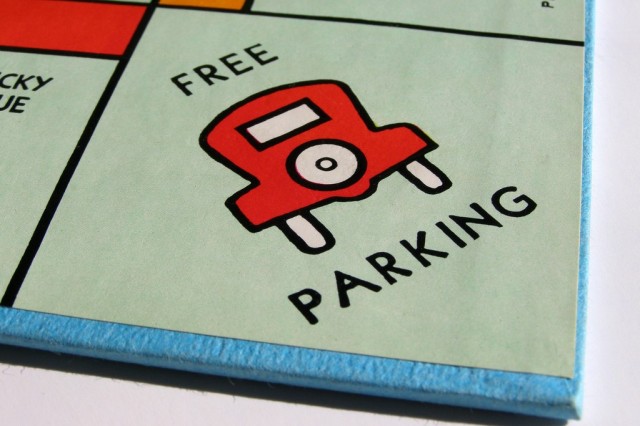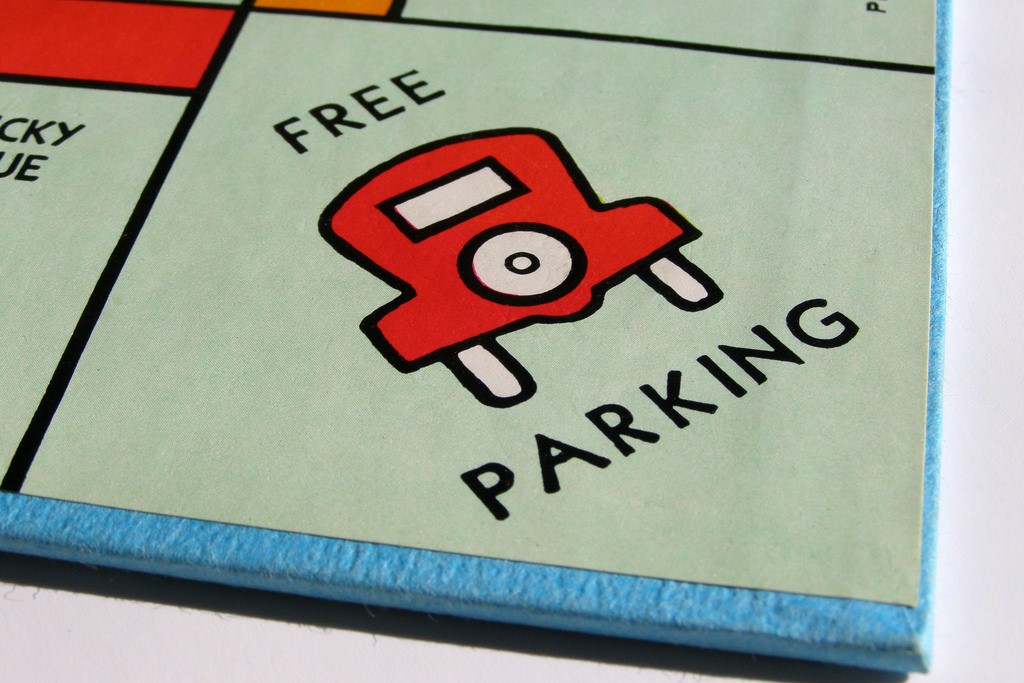As anyone who has accidentally been involved in a fight to the death over the last spot in a shopping mall parking lot can attest[1], nothing in America is more important than parking. In rapidly growing cities, parking is one of the battle lines where newcomers face off against established residents.
Free Parking
Many cities in America require developers to include parking for residents when building new housing. I suppose the rationale is that parking is an important part of the greater transportation infrastructure and developers have a responsibility to provide parking for their residents, and not let them simply fight for local street parking spots.

Free Parking is a fiction, much like our Executive Editior
Forcing developers to provide parking, does not make that parking free, It just shifts the cost from parkers[2] to residents. Parking requirements mean that land must be used to house cars rather than people. This eats up land, reduces the amount of housing that can be built, and subsequently raises the cost of housing. These costs are significant. Space restrictions add up to $500 to a month’s rent, according to one study. Another found that a single parking space per unit raises housing costs by 12.5% a year, and two, 25%.
Parking lots are not highways
Automobiles are subsidized in numerous ways. Perhaps the largest way, is the construction of roads and highways, for example the interstate system cost about $120 Billion. Nearly all roads are funded by taxation, partially because it is hard to charge for road use, partially because a bunch of people can use a road at the same time[3], and partially because most governments believe in providing transportation infrastructure.
Parking is one of the very few pieces of transportation infrastructure that could be left pretty much completely to the market. It is very easy, once you acquire a tow truck, to stop people who have not paid from using a parking spot. Parking spaces cannot be shared like roads can, the most cars that can occupy a parking space at any given time is 1[4]. While mandating parking is a way of subsidizing transportation, cars surely get sufficient (if not massively excessive) subsidies in all kinds of other ways.
People who park cars should pay for parking
If residents desire parking, they should have to pay for it. Residents who don’t need parking shouldn’t be forced to subsidize the parking costs of those who do. Parking requirements are also regressive[5]. Since poorer families spend a greater percentage of their income on housing, and typically own fewer cars, a policy that raises housing costs and lowers the cost of car ownership is exactly the opposite of what we should be doing.
The parking we do add is not worth it. Developers who add parking due to these requirements, often charge residents for it. Often they cannot charge enough to make it worthwhile. Many residents opt to not pay for parking, and instead try their luck with street instead. If the required parking was worthwhile, residents would be willing to pay the cost of providing it. It isn’t, and they don’t.
In most of the fights, such as this one in Seattle, around the issue. The resentment comes largely from current residents who are concerned about losing “their” easy access to street parking. Frustration with change is understandable, especially if you’ve had a good thing going. Parking is not by nature free, and current residents sense of entitlement is a poor policy guide.
Since this is America, cars remain the default transportation option. Not mandating the construction of parking is not equivalent to not building parking. Developers will often include parking, even when they don’t have to. In Denver, in the decade after the city relaxed its mandate to provide parking in new residential buildings, there was exactly one building built that did not include parking.
Parking and driving become less necessary the better the non-driving alternatives are, and cities should work to expand these options. However, mandating the construction of parking is a mistake, even where public transport options are weak, and increasing public transit should not be a prerequisite to removing these regulations.
Mandating developers provide parking is bad policy. It raises the cost of housing, unnecessarily subsidies the cost of driving, and hurts the poor. Fortunately, city governments are realizing this. Seattle is expanding the areas where developers do not have to build parking, and making it easier to rent parking spaces. This is progress.
Related PARTYSHEEPHATS Posts
Should we Privatize Air Traffic Control?
How Much Consumer Surplus Does Uber Generate?
Did Vancouver’s Anti-Foreigner Tax Work?
References, Links, and Further reading
[1] I thought this was a joke, and then I googled “Parking Space fight”. It isn’t a joke.
[2] These people are moore commonly referred to as “drivers”.
[3] Of course there is a limit to how many people can use a road. This is typically called a “traffic jam” or “I-5”.
[4] This isn’t true for all cars.
[5] They hurt the poor more than the wealthy.




What a wonderful going to bed surprise.
Love
Sent from my Verizon, Samsung Galaxy smartphone
LikeLike
I totally agree. Maybe next you could explain why parking at Cherry Creek Mall was never “free” either.
LikeLike
Because you had to go to the Cherry Creek Mall and purchase expensive things?
LikeLike